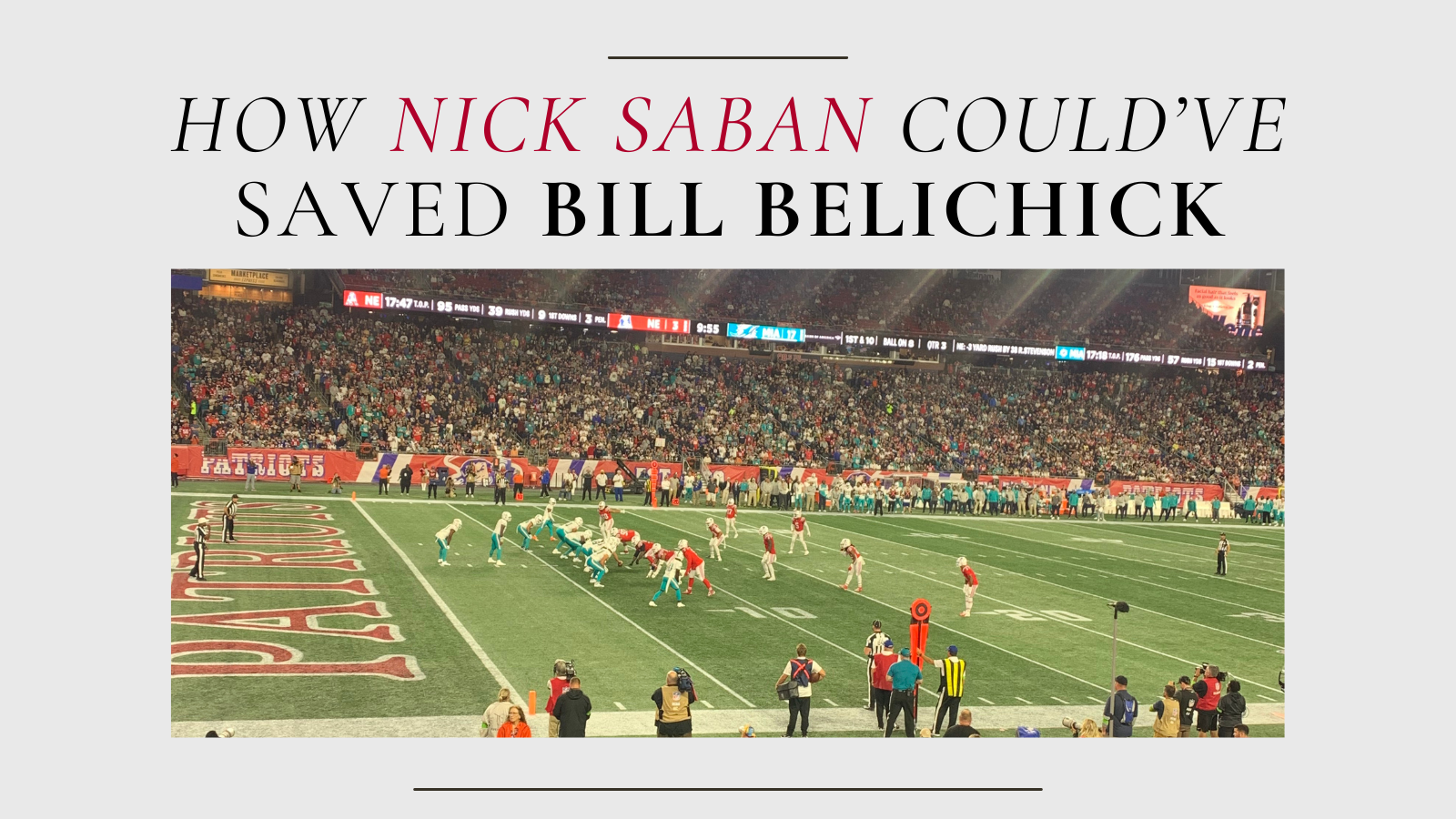How Nick Saban Could've Saved Bill Belichick

Nick Saban saw the writing on the wall. In October 2020, his Alabama Crimson Tide defeated #3 (and then undefeated) Georgia 41-24, racking up 564 yards of offense. Despite their own offensive explosion, the Tide also allowed the Bulldogs to gain 414 yards of offense. 10 years ago, allowing 414 yards on defense might’ve fueled one of Saban’s legendary sideline fiery antics. But in the days following the Tide’s win, Saban, one of the greatest defensive minds of all time, conceded a major philosophical shift in an interview with ESPN.
Saban also acknowledged how the innovative evolution of x’s and o’s have forced his hand. Run-pass options (RPOs) have revolutionized offenses, and their widespread integration into offensive gameplans has caused defensive coordinators to lose sleep and audit their defensive strategies.“It's hard to coach defense now, because there are so many run-pass concepts in what everybody does," Saban said. "I mean, it's really, really hard to coach the secondary ... because you get so many mismatches back there.”
In Nick Saban’s first two national championship seasons in Tuscaloosa (2009 and 2011), his offense registered an average of 451 points for, and allowed 135 points against per season. In his two most recent national championship seasons (2017 and 2020), the Tide offense racked up 574.5 points for, and opponents put up 209.5 points against them.
To help mastermind his offensive revolution, Nick Saban enlisted big-name tickets to fill his offensive coordinator role, including Lane Kiffin, Steve Sarkisian, Brian Daboll, and Bill O’Brien. Cumulatively, those four account for 15 years of NCAA offensive coordinator experience, 11 years of NFL head coaching experience, 23 years of NCAA head coaching experience, and 11 years of NFL offensive coordinator experience.
In tandem, Kiffin and Sarkisian helped mastermind one of the most prolific offenses in NCAA history at USC. The 2005 USC offense was record-setting, averaging 49.1 points and 579 yards per game. With Kiffin as offensive coordinator, the Trojans went 23-3. Kiffin’s time as offensive coordinator in Los Angeles was so successful that he made an almost unheard of leap directly from college coordinator to NFL head coach, as he was hired by the Oakland Raiders before an albeit disastrous 5-15 stint. Daboll’s success with Josh Allen’s Bills in Buffalo at his next stop after Alabama landed him a head coaching job with the New York Giants, while Sarkisian’s success on the sidelines with Saban led to him securing one of the nation’s preeminent blue blood gigs at Texas. Lane Kiffin left Tuscaloosa for a reclamation project at Florida Atlantic before a return to a Power 5 head coaching position at Ole Miss. Bill O’Brien took the jump from Alabama’s OC position back to Foxborough.
In addition to Saban’s reorganized coaching staff, he also redirected many recruiting resources to focus on the offensive side of the ball. These redirected recruiting efforts have fueled an influx of offensive starpower onto the Alabama campus. Since the onset of Saban’s offensive renaissance (we’ll use Derrick Henry’s 2015 Heisman as the line of demarcation), three of the last eight Heisman Trophy winners have donned Alabama crimson, all on the offensive side of the ball. A Heisman Trophy had never come home to Tuscaloosa before Saban’s tenure, a drought initially broken by Mark Ingram’s 2009 Heisman Trophy win. In the last five NFL Drafts, 15 Alabama offensive players have been drafted in the first round, including four top 10 picks and 2023 first overall pick quarterback Bryce Young.
Belichick and Saban’s relationship has been well-documented, Saban served as Belichick’s defensive coordinator for the Cleveland Browns from 1991-94. The two were the subject of an HBO Documentary titled Belichick & Saban: The Art of Coaching, which covers “their interwoven history, admiration, coaching philosophies and more.” Historically, their coaching philosophy has been almost a mirror-image, but only one of them has effectively responded to the evolution of the game. When Saban was pressed on his feelings about the shift towards offense, “‘I don't like it," he said with a wry smile”.
A fair counterpoint to this argument would be “well, yeah, but the college game is one thing. But the pro game, that’s another.” To which I present you, a quick case study comparison of the first five Super Bowl Champions of the 2000s (which also coincides with Bill Belichick’s first season as Patriots head coach), and each champion team’s league-wide rank in points for and points against.
First 5 SB Champs of 2000s | Last 5 SB Champs | |||||
Super Bowl Champion | Points For Rank | Points Against Rank | Super Bowl Champion | Points For Rank | Points Against Rank | |
2000 Ravens | 14 | 1 | 2022 Chiefs | 1 | 16 | |
2001 Patriots | 6 | 6 | 2021 Rams | 7 | 15 | |
2002 Buccaneers | 18 | 1 | 2020 Buccaneers | 3 | 8 | |
2003 Patriots | 12 | 1 | 2019 Chiefs | 5 | 7 | |
2004 Patriots | 4 | 2 | 2018 Patriots | 4 | 7 | |
Average Rank | 10.8 | 2.2 | Average Rank | 4 | 10.6 | |
As shown above, the first five Super Bowl champions of the new millennium (including three Patriots championships) were stout on defense, averaging a rank of 2.2 in points against, while recording a moderately pedestrian rank of 10.8 in terms of points for on offense. Each of these teams ranked in the top six in points against, with four of the five ranking in the top two (including three ranking first in the league). Ironically, the Patriots sixth ranked defense in 2001 is the outlier.
Regarding offensive production, we saw teams with the 14th ranked offense, the 18th ranked offense, and 12th ranked offense hoist the Lombardi Trophy in the early 2000s. For comparison, the 12th, 14th, and 18th ranked offenses in the NFL went a combined 21-30 last year. Now fast forward contrast this with the last five Super Bowl champions, each offense has ranked in the top 7, with an average rank of 4 and an average defensive rank of 10.6. For Super Bowl championship teams, these ranks have seemingly inverted. This season, the Patriots rank 31st in points for, only one point ahead of the New York Giants.
In 2018, Ian O’Connor reported in his book, Belichick: The Making of the Greatest Football Coach of All Time, that an unnamed Patriots assistant coach told him “[If] you gave us any of the top 15 [quarterbacks in the NFL], we could do it. I don’t think the coaches view Tom as special as everyone else in football does. [Owner Robert Kraft] thinks Tom is the greatest gift ever, but the coaches don’t.” This jaw-dropping quote is not only an indictment of Belichick's inability to assess offensive talent, it provides valuable insight into how he views the most important position in football: as simply another cog in the machine. Other teams are investing immense draft capital (see San Francisco 49ers trading three first round picks to select QB Trey Lance), guaranteed money, surrounding said quarterback with weapons, and hiring offensive/QB gurus as head coaches in hopes of finding and developing their next franchise quarterback. Meanwhile, Belichick’s archaic outlook leads him to truly believe that he can treat the position the same as every other position on the field.
The Patriots don’t even need to look far to see the offensive revolution around them, it is on full display in their own division in South Florida. The Miami Dolphins hired Mike McDaniel, one of the new-school Shanahan tree offensive minds as head coach, to take 2020 fifth overall pick Tua Tagovailoa under his wing and maximize the southpaw’s potential. They then spent a 2021 sixth overall pick on wide receiver and Tagovaiola’s former Alabama teammate Jaylen Waddle. In March 2023, general manager (and Massachusetts native) Chris Grier pulled the trigger on the Tyreek Hill trade, exchanging a first-round pick, second-round pick, two fourth-round picks, and a six-round pick. To top things off, after completing the trade, the Dolphins locked up Hill to a four-year, $120 million extension. This extension included $72.2 million guaranteed, making Hill the highest-paid wideout in the league. Through six games, Hill has racked up 42 catches for 814 yards and six scores. He is on pace for 119 catches and 2,306 yards, which would make him the first player in NFL history to reach the 2,000 receiving yard mark. Obviously, Hill’s ability to keep this pace up might be nothing short of miraculous, but the moral of that story is that Belichick will not, and has not, sacrificed the capital (draft or cash) necessary to procure top-line offensive talent. In fact, he pushed out the greatest generational offensive talent that he had.
The thought of giving up five picks and $72.2 million guaranteed for a wide receiver, drafting a quarterback fifth overall, and a wide receiver sixth overall in back-to-back drafts would probably have Bill Belichick vomiting into a brown paper bag. And that is why the Patriots sit at 1-5 and hadn’t scored a touchdown since the national football nightmare of Kelce-Swift had been hard launched, until Sunday. They inexplicably let Mac Jones’ favorite target Jakobi Meyers walk in free agency, and then did not draft an offensive skill position player until the 6th round in the 2023 draft. In that same draft, the Patriots took kicker Chad Ryland in the 4th round and punter Bryce Baringer in the 6th round. Free agency signing JuJu Smith-Schuster has been a dud and appears to be struggling with a lingering knee injury, and the offense lacks any semblance of explosiveness.
Last year, Belichick seemingly torpedoed second-year quarterback Mac Jones’ development. After his first season, Jones had been discussed as possibly the best quarterback of that class under the tutelage of offensive-orientated Josh McDaniels. Upon McDaniels’ departure to Las Vegas as Raiders head coach, Belichick hired defensive and special teams “minds” Joe Judge and Matt Patricia to run the Patriots offense. To exacerbate the situation, Belichick played musical chairs with Jones and backup Bailey Zappe and refused to give (at-least publicly) a vote of confidence on Mac Jones. Belichick’s handling of the entire situation seems to have rendered irreversible damage on Jones, who had a promising rookie season. Now, people are questioning if he can even cut it in the league.
The days of “defense wins championships” are long-gone. Belichick’s emphatic reluctance to depart from the football philosophy that has brought him immense past success, and adjust to the times, might be his ultimate downfall. The major distinction between Saban and Belichick is that Saban was willing to depart from his personal philosophy in a relentless pursuit of success and winning, while Belichick has remained inexcusably stubborn in his archaic ways and stood on the sidelines while the game passed him by. Because of that, only Saban will be able to leave on his own terms. Belichick should always be remembered and admired as an all-time defensive mind, but his inability and unwillingness to shift philosophically means it is time for him to go.

0 Comments Add a Comment?